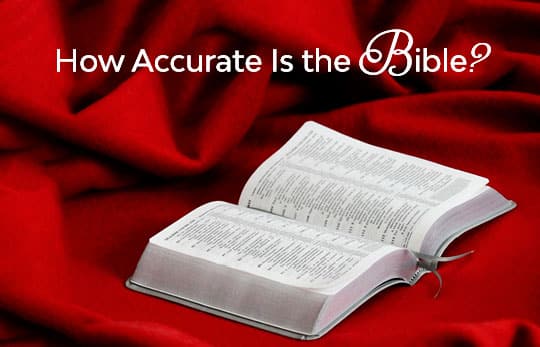
How accurate is the Bible? That is a question many have asked after talking with a Mormon or after hearing a college professor declare the Bible to be filled with inaccuracies and therefore not trustworthy. It is understandable that the cults are motivated to discredit the Bible, and it is understandable that an unbelieving professor stepped outside of his expertise. But how should we respond to 300,000 to 500,000 variants in the source manuscripts of our Bible? Can we really trust the Bible? To answer these questions, we need to start by understanding the One who wrote the Bible.
Character of God
The character of God is the only real reason we can trust the Bible to speak the truth. Most critics are not aware they have a faulty assumption that colors their view of the Bible. Here is how most people view God.
You thought that I was just like you . . . Psalm 50:21 (NASB)
God speaks boldly in this verse. He is not like us. He does not make mistakes. He does not need the Encyclopedia Britannica, the Library of Congress, or a news reporter to help Him understand something or use to collect information. He already knows everything and the book of Numbers tells us why we can trust Him when He speaks or writes,
God is not a man, that He should lie, Nor a son of man, that He should repent; Has He said, and will He not do it? Or has He spoken, and will He not make it good? Numbers 23:19 (NASB)
and,
. . . in order that by two unchangeable things, in which it is impossible for God to lie . . . Hebrews 6:18 (NASB)
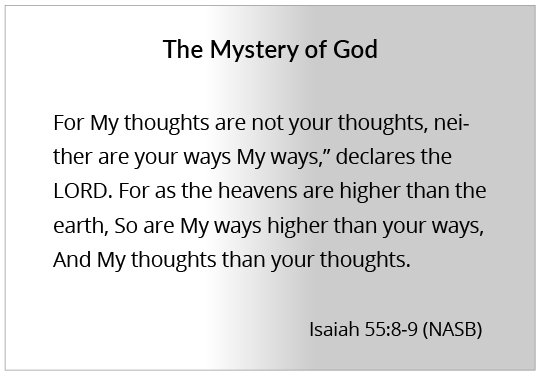
God Wrote Scripture
2 Timothy 3:16 tells us that God wrote the Bible,
All Scripture is inspired by God . . . 2 Timothy 3:16 (NASB)
The word “inspired” comes from a Greek word which means “God-breathed.” That is, God “breathed” the words that were to be written. He wrote all 66 books, all 1189 chapters and all 31,173 verses of the Bible. This is an easy task for an omnipotent, omniscient God. He is not like us – He does not grow tired (Isaiah 40:28), and He does not sleep (Psalm 121:4). He does not lie (Numbers 23:19)! That is why we can trust what He wrote.
The sum of Thy word is truth, And every one of Thy righteous ordinances is everlasting. Psalm 119:160 (NASB)
Proof Scripture is Written by God
How do we know the Bible was written by God? Several years ago, I asked a Christian friend why he believed the Bible was true. He told me that he knew God was real by the experiences he had and by how God had helped him. I told him the Hare Krishnas, Mormons, Jehovah’s Witnesses, members of the occult, Muslims and Hindus all believe their god is the true one because of their experiences. He had not thought about that. If experience is the test of truth, then are we all correct? If so, we have a problem. How do we then know that God is speaking to us in the Bible?
The answer is already given to us in the Bible. Listen to Deuteronomy 18:20-22,
But the prophet who shall speak a word presumptuously in My name which I have not commanded him to speak, or which he shall speak in the name of other gods, that prophet shall die.’ “And you may say in your heart, ‘How shall we know the word which the LORD has not spoken?’ “When a prophet speaks in the name of the LORD, if the thing does not come about or come true, that is the thing which the LORD has not spoken. The prophet has spoken it presumptuously; you shall not be afraid of him. Deuteronomy 18:20-22 (NASB)
Fulfilled prophecy is the signature that God has spoken in the Bible. The Bible is the only sacred book that contains future predictions that have come true. It is a very unique book with 737 prophecies recorded in about 8,500 verses. That is about 25% of the Bible. The prophecies occur in both the Old Testament and New Testament. The Old Testament prophets, the New Testament apostles, and Jesus Christ all made predictions about the future. They have all come true except for those which are yet future. The Bible is also a book of history whose facts are continuously being proven to be true with many archaeological findings. The Bible is accurate when it speaks to history. When it makes predictions, they come true. It is Truth.
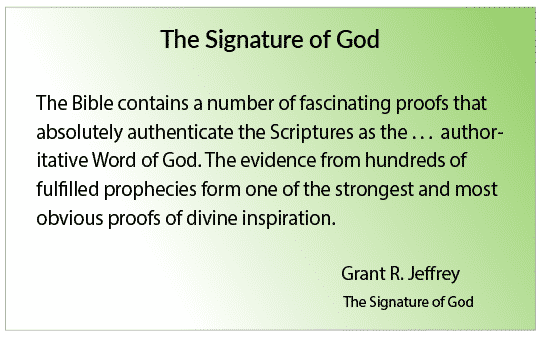
Mystery of Dual Authorship
God did not write the Bible as we do a letter. He used two authors.
. . . for no prophecy was ever made by an act of human will, but men moved by the Holy Spirit spoke from God. 2 Peter 1:21 (NASB)
This verse tells us that God the Holy Spirit “moved” human authors to write the Bible. The Greek word for “moved” comes from the root word phero which means “to carry,” “to bring” or “to bring along.” This means the Holy Spirit “brought” men along. He caused men to write what He wanted them to write. The different books of the Bible had different authors who used their own style, language and grammar, but the Holy Spirit “carried” them in their writing. What they wrote was what the Holy Spirit wanted to be written. Here is an example,
You spoke by the Holy Spirit through the mouth of your servant, our father David: “‘Why do the nations rage and the peoples plot in vain?” Acts 4:25 (NIV)
Who spoke through David? The answer is the Holy Spirit! At the end of one book the apostle Paul wrote, we are given a hint that the influence of the Holy Spirit on the writer was at times hard to detect,
. . . and I think that I also have the Spirit of God. 1 Corinthians 7:40 (NASB)
Paul appears to not be sure. In his other books he does not make this comment. This is remarkable because it implies on the other occasions he knew the Holy Spirit was guiding him, but this time he was not completely sure. The Holy Spirit did not dictate the message, but yet He was guiding the apostle. Who were the authors? The answer is both men and the Holy Spirit.
Books of the Bible
Some have wondered if any books in the Bible do not belong and if any are missing. The answer to our question comes to us directly from Jesus Christ Himself.
Old Testament
At the time of Jesus’ life, the only Scriptures that existed were the Jewish Scriptures – the Tanakh. Jesus quoted from them. He taught them. He believed them. Here is an example. Jesus is speaking,
You search the Scriptures, because you think that in them you have eternal life; and it is these that bear witness of Me . . . John 5:39 (NASB)
He also considered them to be authoritative and lasting,
Do not think that I came to abolish the Law or the Prophets; I did not come to abolish, but to fulfill. For truly I say to you, until heaven and earth pass away, not the smallest letter or stroke shall pass away from the Law, until all is accomplished. Matthew 5:17-18 (NASB)
Notice that Jesus refers to the Law and the Prophets. These are two sections of the Jewish Scriptures called the Tanakh. The Tanakh was the Jewish version of the Old Testament Scriptures that existed at the time of Christ. It still exists today. The Tanakh was divided into three sections: The Law, The Prophets and the Writings. Jesus clearly recognized it as being authoritative. Near the end of the gospel of Luke, Jesus made a significant statement about the Scriptures. He endorsed the entire Tanakh. That is, He endorsed The Law, The Writings and then He referred to the Psalms, which is the largest book in The Writings.
Now He said to them, “These are My words which I spoke to you while I was still with you, that all things which are written about Me in the Law of Moses and the Prophets and the Psalms must be fulfilled.” Luke 24:44 (NASB)
In Luke Jesus refers to the prophets being murdered from Abel to Zechariah.
. . . from the blood of Abel to the blood of Zechariah, who was killed between the altar and the house of God; yes, I tell you, it shall be charged against this generation. Luke 11:51 (NASB)
When Jesus did this, He once again endorsed the entire Tanakh or the Old Testament Scriptures as we know them. Notice that Abel appeared in the book of Genesis which is the first book in The Law. Zechariah appears in the last book of The Writings, which is 2 Chronicles. That is, Jesus endorsed all of the Old Testament as we know it. Later in Luke 16:29, Jesus endorsed The Law and The Writings once again.
During His ministry, He also endorsed The Twelve or the minor prophets when He referred to Jonah being in the belly of a great sea monster and alluding to him being there three days and nights (Matt. 12:40-41). In short, Jesus recognized the Jewish Scriptures from Genesis to Chronicles as real and authoritative.
The Dead Sea Scrolls have proven to modern critics that the Tanakh, as we know it today, has not changed since the time of Christ. In fact, the Dead Sea scrolls predate Christ by about by 100-15 0 years. So when He referred to The Law and The Prophets and The Writings, He referred to the Tanakh as we have it in A.D. 2020.
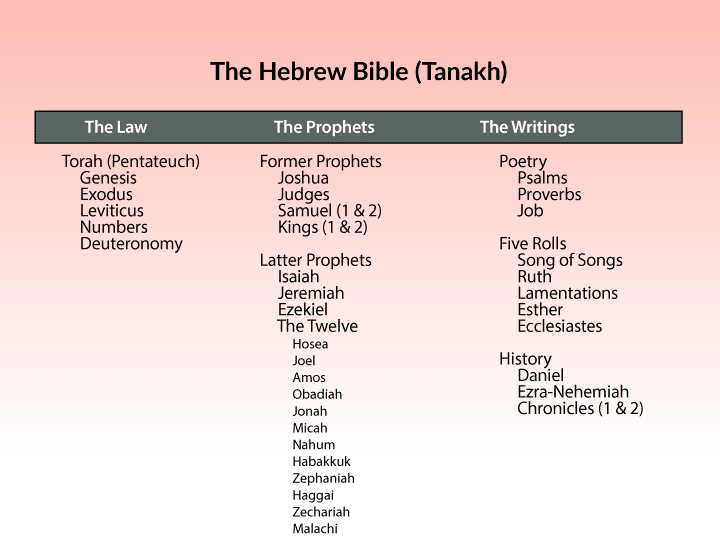
New Testament
Many are under the impression that there was a great debate about which books should be included in the New Testament. The truth is the apostles affirmed and confirmed the contents of the New Testament during their lifetime. The great church debates were largely attempts to remove certain books or challenges to the inspiration of certain books. This is common in our culture today, even among many Christians.
If we look carefully at the New Testament, we discover that the apostles were actively reading and determining which writings were authoritative. Maybe the most significant statement about the New Testament actually comes from Jesus,
But when He, the Spirit of truth, comes, He will guide you into all the truth; for He will not speak on His own initiative, but whatever He hears, He will speak; and He will disclose to you what is to come. John 16:13 (NASB)
Here Jesus tells the apostles that the Holy Spirit will guide them into truth: that is, He will reveal truth to them. This was required since Jesus wanted His church to be built on the apostles,
. . . having been built upon the foundation of the apostles and prophets, Christ Jesus Himself being the cornerstone . . . Ephesians 2:20 (NASB)
So Jesus endorses His apostles through the ministry of the Holy Spirit. As the years elapsed, the apostles wrote the majority (81%) of the New Testament and their companions and Jesus’ brothers wrote the balance. It must have been a surprise to them to discover that Paul the apostle would write just about half of the books!
The New Testament reveals that the writings of the apostles and others were passed around for all to read (Colossians 4:16; 1 Thessalonians 5:27). The apostle Peter reveals that the letters were reviewed and evaluated as to whether they were inspired. Peter reviewed Paul’s writing. Listen to this,
. . . just as also our beloved brother Paul, according to the wisdom given him, wrote to you, as also in all his letters, speaking in them of these things, in which are some things hard to understand, which the untaught and unstable distort, as they do also the rest of the Scriptures, to their own destruction. 2 Peter 3:15-16 (NASB)
That is, Peter considered Paul’s letters to be Scripture (“the rest of the Scriptures”). So Peter endorsed Paul and Paul endorsed Luke when he writes,
For the Scripture says, “YOU SHALL NOT MUZZLE THE OX WHILE HE IS THRESHING,” and “The laborer is worthy of his wages.” 1 Timothy 5:18 (NASB)
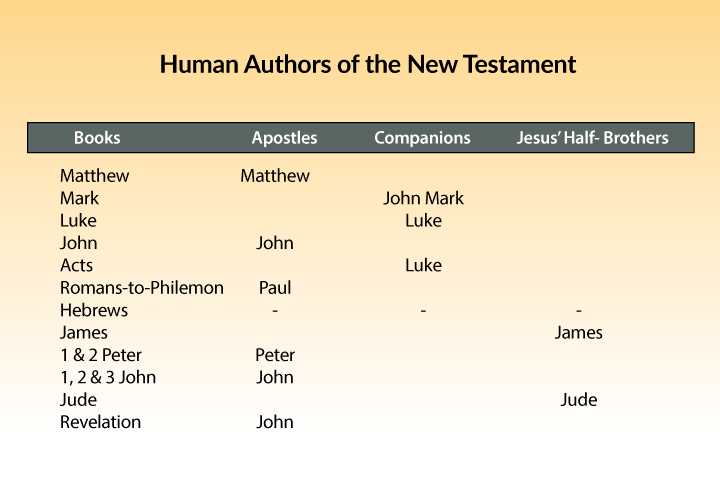
The first part of that quote is from Deuteronomy 25:4 from the sacred Scriptures. The second part is from a passage which is found only in Luke 10:7. Now notice that Paul refers to both as Scripture. Paul considered the writings of Luke to be equal to that found in Deuteronomy.
How did the apostles know about Matthew, Mark, Luke or Paul’s letters? Romans 16:22; 1 Corinthians 5:9; Colossians 4:16 and 1 Thessalonians 5:27 all reveal that the writings of the New Testament authors were distributed for all to read. In summary, the New Testament documents were actively being evaluated regarding their inspiration.
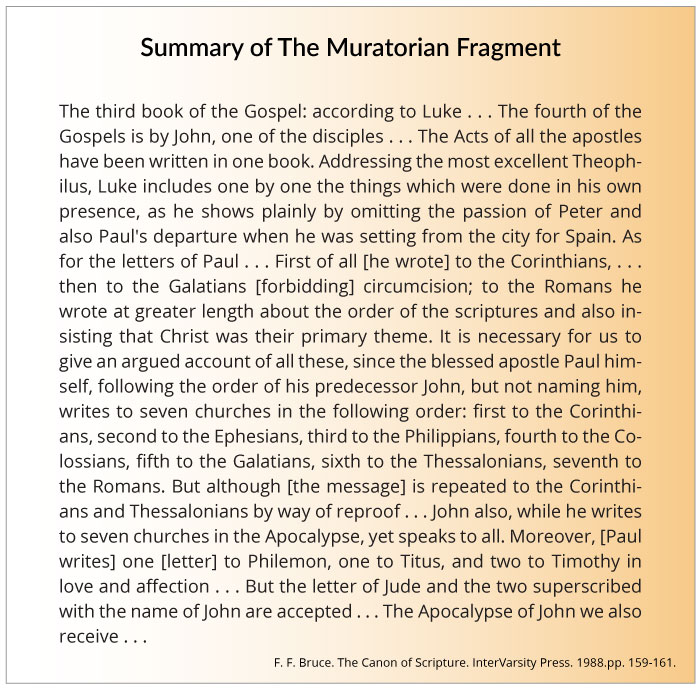
The earliest list of all of the New Testament books is found in a manuscript called the Muratorian fragment (A.D. 150-170). It is damaged. That is why it is called a fragment. The beginning has been torn off and references to some books are missing. The author of the document gave a running account of the development of the New Testament. In the document, all of the New Testament books are listed except for Matthew, Mark, Hebrews, James, 1 & 2 Peter and 3 John. Matthew and Mark are probably missing due to the tear since the author of the Muratorian refers to the “third book of the gospel.” So only Hebrews, 1 & 2 Peter and 3 John are missing from the list. Were they part of a torn piece too? We do not know. It should be noted that the “missing” books were already recognized by other authors. The Epistle of Barnabas, which was written by Clement of Rome (A.D. 70-79), quotes Matthew and alludes to 2 Peter.[1] In A.D. 95-97, Clement of Rome quotes a number of books, including Matthew, Mark, Hebrews and 1 Peter as being authoritative.[2] Ignatius (A.D. 110-117) also quotes a large variety of books including Matthew, Mark, James and 1 Peter.[3] The Muratorian Fragment includes other books but clearly states they were not received. This reveals that the books of the New Testament were recognized very early.
The New Testament was written by the apostles who were equal to the Old Testament prophets (Ephesians 3:5; 2 Peter 3:2). Both were moved by the Holy Spirit to write what God wanted written. The New Testament is endorsed by fulfilled prophecy and by the apostles. The apostle John was the last apostle alive when he wrote his smaller epistles and Revelation. By this time the New Testament books had been identified and endorsed.
It is wrongly believed that the books of the New Testament were not identified until the Council of Nicea (A.D. 325). But the discussion above demonstrates that the contents of the New Testament were already known near the death of the Apostle John (A.D. 100-110). Since it is obvious that the apostles were identifying which books were Scripture, the Apostle John wrote the last book. Subsequently, the inspiration of some of the books was challenged and defended by the early church councils.
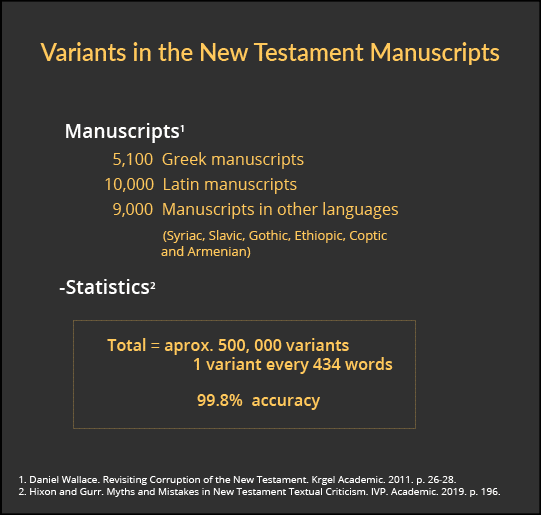
Copyists’ Errors in the Bible
The original manuscripts written by the prophets and the apostles under the guidance of the Holy Spirit were without error. We call these original documents the autographs. Over time, these autographs were copied. They copied them by handwriting. Consequently, Wallace states in his book, published in 2011, that the number of Greek manuscripts was about 5,600. Both Wallace and Hixson and Gurry state that some manuscripts are duplicates so that leaves us with only 5,100 unique copies.[4] There are approximately 10,000 Latin manuscripts, and altogether there are about 20,000 manuscripts in various languages, including Greek.[5]
Since these manuscripts were copied, errors were made in the copying process. Subsequently, as the documents were copied, errors were introduced over time. Some errors are “nonsensical errors,”[6] and other errors were variations in words, missing words, added words, or grammatical errors.[7] When scholars try to determine the actual reading of the original documents, they do not know which variation is an error or which is the correct reading. So, these variations are called variants. Variants are not necessarily an error, they are just differences between manuscripts.
Some intentional changes were made by the human copiers in an attempt to clarify the meaning of a passage. In a few rare cases, it is clear someone tried to change the meaning to reflect a doctrinal opinion.
What is a Variant?
Daniel Wallace states, “A variant is simply the difference in wording found in a single manuscript or a group of manuscripts (either way, it’s still only one variant) that disagrees with a base text.”[8]
Let us illustrate! The chart of four manuscripts from John 3:16 is an example of four actual Greek manuscripts. Let us assume that we select the first line (manuscript B) to be the baseline manuscript and compare the other manuscripts against it. Then, as you examine the chart, you will discover that the fourth manuscript has three variations or three variants compared to the baseline manuscript (the first line). That is, two words are different and one word has been added in the fourth manuscript. In this simple example, these variations would be called three variants. If we found two more variations in either the second or third manuscripts, that would result in three more variants, for a total of five variants. If we included more manuscripts and continued the process, the number of variants would grow. That is what is happening every year as more manuscripts are being discovered.
At first, this would appear to be a problem for the modern day reader. You may be asking how accurate is the Bible? How many variants are there in the Bible?
Old Testament Variants
The Old Testament copies have very few variants since the Jewish rabbis had very strict rules about copying accuracy. In fact, the rabbis would destroy copies if there were too many errors. The discovery of the Dead Sea Scrolls was a major event. It provided Biblical scholars with proof that the Old Testament contained 39 books and provided thousands of manuscript fragments. Prior to that, the Christian community had only three partial copies and one complete copy. With recent discoveries of Aramaic cursive copies, we now have copies dating from 250 B.C. By comparing all of these Old Testament copies, differences between the documents have been identified. These differences are called variants. There are very few variants in the Old Testament compared to the New Testament. Of the Old Testament variants, only sixteen are of any significance.
New Testament Variants
The number of New Testament variants are increasing as new ancient manuscripts of the books of the New Testament are found.[9] Consequently, authors once reported that the number of New Testament variants were 200,000. That was accurate at the time of their publication. But when Daniel Wallace published his book in 2011, he estimated the number of variants to be somewhere between 300,000 to 400,000.[10] When Hixson and Gurry published their book, they estimated the number to be approximately 500,000 variants.[11]
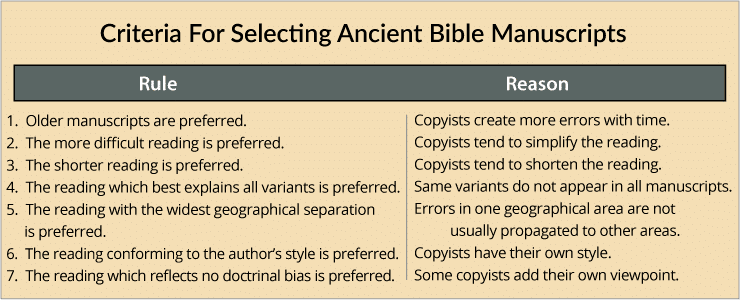
How is the Original Text Recovered?
Remember that a variant is any difference between manuscripts. Before we go further, we need to know how the various manuscripts are used to determine how the Bible should read. Linguistic scholars start by selecting a group of the higher quality manuscripts to determine how the Bible should read. Criteria are used to determine which manuscripts are more trustworthy. For example, older manuscripts are considered to be more reliable since they should be less subject to additions. Later manuscripts tend to have multiple additions and copying errors. Linguistic scholars apply these rules to a set of manuscripts to select a set of manuscripts which are used to compile or construct an “accurate” Greek text of the Bible. This compiled text is called an apparatus. The linguistic scholars then identify every spelling error, every letter and word that is omitted, every vowel that is wrong and even grammatical errors.
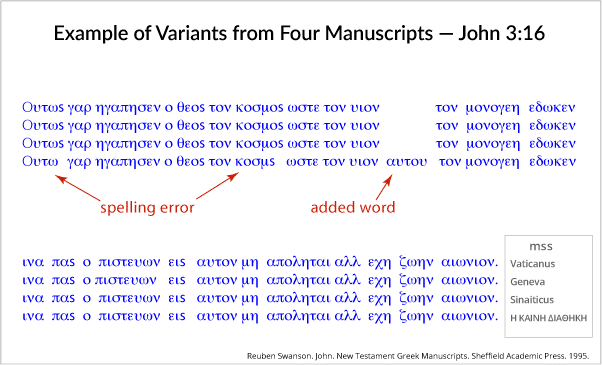
How Accurate is the Bible?
Let’s consider another example. Hixson and Gurry stated at the time their book was published that there are 1,659 manuscript variants in John 18. Among those manuscripts there were 3,058 variants. That means there is one variant for every 434 words.[12] This translates to a Bible that is 99.8% accurate.[13] Then they state that,
How many of these [variants] deserve the notice of typical English Bible readers? Based on the major modern translations, the answer is zero. Not a single note about any variant in John 18 is to be found in the ESV, NIV, NRSV, or even the richly footnoted NET. The translators of these versions are right in this since all of the major variants in John 18 are easily resolved, do not significantly affect the meaning, or both.[14]
They also state that they agree with Daniel Wallace that some minor changes in meaning in a few places in the New Testament may be affected, but no core Christian doctrines are affected.[15] The Bible is really unique. The Bible is very accurate! The Bible very accurately reflects what the prophets and the apostles wrote.
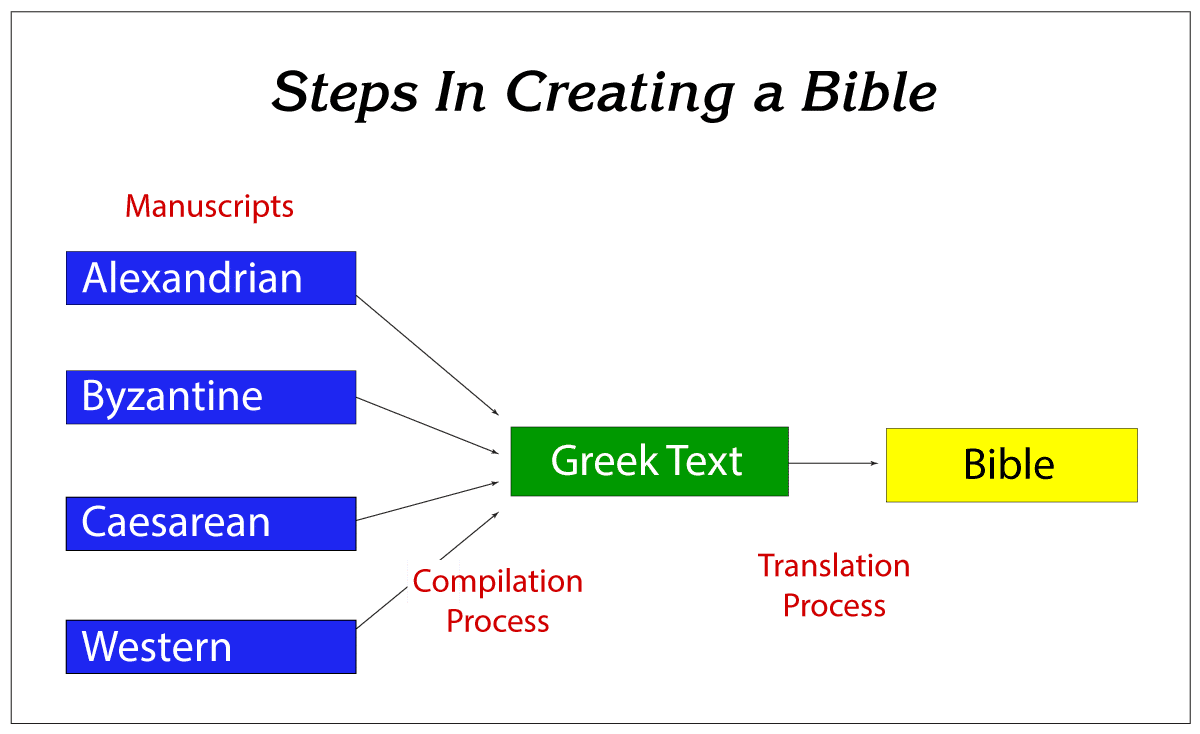
Today’s English Bibles
We have been describing the creation of an apparatus, which is a compilation of high quality Greek documents to determine how the New Testament should read. The question we need to ask now is, “How accurate are the English translations when compared to the apparatus of the Old and New Testaments?” Note that the Old Testament has a Hebrew and Aramaic apparatus and the New Testament has a Greek apparatus. The accuracy of the English translations depends on which translation we are talking about.
Each translation team has a philosophy that is employed in the translation process. Some Bibles try to be more literal while others seek to be more dynamic. That is, the translation tends to explain the passage and, consequently, some are like a commentary. For the serious student who does not know Hebrew and Greek but wants to know how the original Hebrew and Greek reads, a more literal translation is recommended. For these students the Legacy Standard Bible (LSB) is currently the best Bible for serious Bible study. Next is the New King James Version (NKJV), the New American Standard Bible (NASB) and then the English Standard Version Bible (ESV). For Bible study you want a Bible that is as close to the Hebrew, Aramaic and Greek manuscripts as possible. The LSB, NKJV, NASB and ESV do that.
The NIV, New Living Translation (NLT), Message and Amplified Bibles are great Bibles for easy reading, but these are not recommended for Bible study. Here are some examples as to why they should be avoided.
English Bibles vs Greek Example
In order to explain, we will start with a passage from the New Testament and then compare the English translations to the Greek text. The Scripture that appears below the name of each Bible is Acts 14:23.
First, we present a literal translation of the N27 apparatus. An apparatus is the base Greek text that results from combining a set of the best manuscripts. Then this Greek text of the New Testament is translated into an English or a Spanish Bible, for example. The NA27 Greek Apparatus is the latest version.
Literal Translation of the Greek Apparatus (NA27)
Having appointed and them every church elders, praying with fastings they committed them to the Lord in whom they believed. Acts 14:23
The following Bibles are presented in descending order of accuracy. That is, the most literal or most accurate Bible is the LSB and the least accurate Bible is God’s Word.
Legacy Standard Bible
And when they had appointed elders for them in every church, having prayed with fasting, they commended them to the Lord in whom they had believed
English Standard Version
When they had appointed elders for them in every church, having prayed with fasting, they commended them to the Lord in whom they had believed.King James Version Bible
And when they had ordained elders in every church, and prayed with fasting, they commended them to the Lord, on whom they had believed.New King James Version Bible
So when they had appointed elders in every church, and prayed with fasting, they commended them to the Lord in whom they had believed.New American Standard Bible
And when they had appointed elders for them in every church, having prayed with fasting, they commended them to the Lord in whom they had believed.New International Version
Paul and Barnabas appointed elders for them in each church and with prayer and fasting committed them to the Lord in whom they had put their trust.New Living Translation
Paul and Barnabas also appointed elders in every church. With prayer and fasting, they turned the elders over to the care of the Lord, in whom they had put their trust.Living Bible
Paul and Barnabas also appointed elders in every church and prayed for them with fasting, turning them over to the care of the Lord to whom they trusted.Amplified Bible
And when they had appointed and ordained elders for them in each church with prayer and fasting, they committed them to the Lord in Whom they had come to believe [being full of the joyful trust that He is the Christ, the Messiah].The Secret New Kingdom Bible
They chose elders for each church, by praying and giving up eating for a certain time. These elders had trusted the Lord, so Paul and Barnabas put them in the Lord’s care.God’s Word
They had the disciples in each church choose spiritual leaders, and with prayer and fasting they entrusted the leaders to the Lord in whom they believed.
Comparisons
The LSB, KJV, NKJV, NASB, and the ESV are very close to the actual wording of the original Greek version of the book of Acts. This is typical for these Bibles. The other Bibles differ substantially.
The last one, God’s Word, is the worst because it says the disciples of each church selected the elders and that is not true. The Greek does not say that. The actual Greek word for “appoint” means “to select.” The translators of this Bible used an older, out of date meaning (400 B.C.) of the word which meant “to elect by show of hands.” The translators either did not know the word had changed meaning by the time of Christ or they wanted to convey the thought that a congregational form of selecting leaders was biblical. This is an old, erroneous meaning historically given to this verse.
The NIV, NLT, The Secret Kingdom New Testament Bible, and Living Bible added to the Word of God when they added the words, “Paul and Barnabas.” These words are not in the Greek. They did this to make the Bible more readable. Unfortunately, they are adding their own opinions. For some who want to study the Word of Truth, this is unacceptable. This example is typical of these Bibles.
The Master Seminary faculty compared a number of English Bibles to the Greek text for the book of Romans. They discovered that the KJV, NKJV and NASB were the most accurate translations of the book of Romans.[16] A similar result was obtained for the book of 1 Corinthians.[17] There was some change as one would expect, but the top five Bible translations were unchanged. This study was done before the LSB and the ESV were published. The LSB is the best Bible available as of January 2022. However, the KJV Bible is not recommended since it contains older English words that are difficult for many to understand and for other reasons that are explained in “Is The King James Bible The Best Bible?” The NKJV is recommended because many of the words in the KJV whose meanings had changed were corrected to a more accurate translation.
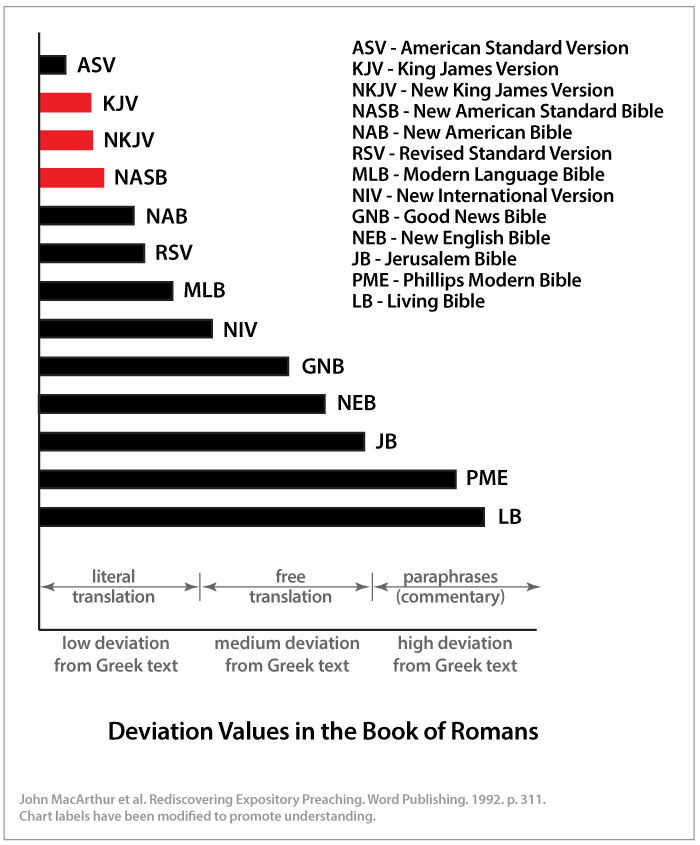
A knowledge of the original languages is needed by someone who seriously desires to know what the Bible really says. It will take study, but the benefits are rewarding. The best Bibles for serious study of the Word of God are the Legacy Standard Bible, New King James Version, New American Standard and the English Standard Version Bibles.
Conclusion
Jesus said,
For truly I say to you, until heaven and earth pass away, not the smallest letter or stroke shall pass away from the Law, until all is accomplished. Matthew 5:18. (NASB)
We should thank God for keeping His Word pure and we should ask the Holy Spirit to help us understand what He has so carefully preserved.
To Him be the glory forever and ever.
References:
2. Clement of Rome. Corinthians.
3. Ignatius. Ephesians 5
4. Wallace. Ibid, p. 7-28; Hixson and Gurry, Ibid. p. 52.
5. Wallace. Ibid. p. 28.
6. Hixson and Gurr. Myths and Mistakes in New Testament Textual Criticism. IVP. Academic. 2019. p. 196.
7. Daniel Wallace. Revisiting Corruption of the New Testament. Krgel Academic. 2011. p. 26.
8. Ibid.
9. Wallace. Ibid., p. 27.
10. Ibid.
11. Hixson and Gurry. Ibid. p. 210.
12. Hixson and Gurry. Ibid. p. 196.
13. Ibid. p. 197.
14. Ibid. p. 196-197.
15. Ibid. p. 197.
16. John MacArthur et al. Rediscovering Expository Preaching. Word Publishing. 1992. p. 311.
17. Ibid., p. 314.
Suggested Links:
Is The King James Bible The Best Bible?What Bible would you recommend?
How do you decide which Bible to use?
Are any of the English Bible translations 100% accurate?
Could the people who wrote the Bible have made a mistake?
Does the Bible contain errors, discrepancies, contradictions or mistakes?
Are any of the English Bible translations 100% accurate?